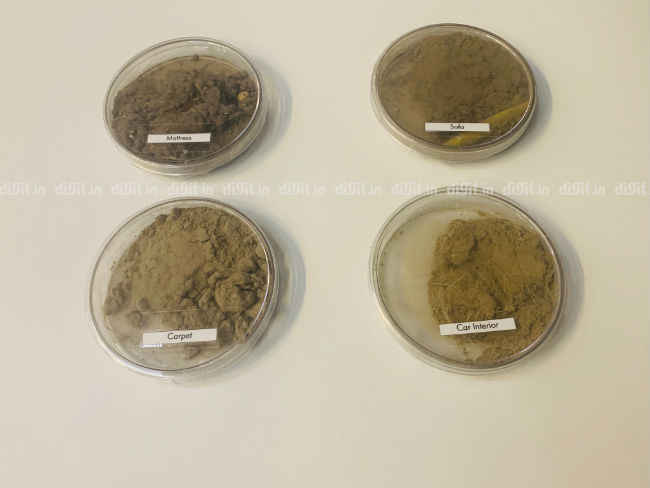You, me and everyone in India is in bed with creepy, skin-eating dust mites. Not only do we willfully let these tiny bugs eat away at 20g - 66g of dead skin we produce each month, they also latch onto our clothes, shoes and other body parts to travel around the places we visit. A new study conducted by Dyson, in association with the FICCI Research and Analysis Centre (FRAC), has revealed alarming results about the allergens present in house dust found in India.
Now, you might be wondering why we at Digit are talking about a dust study. Simply put, Dyson conducted the said dust study in India to understand the best possible ways of optimising their V-series vacuum cleaners to better suit Indian household needs. Dyson and FRAC were able to collect 12,491 grams of dust from 100 urban homes across Delhi, Bengaluru and Mumbai. The samples were collected from mattresses, sofas, carpets, cars and such in order to analyse the composition of dust found in Indian homes.
What the study discovered was that cockroach allergens, including their saliva, faeces and shredding body parts, are commonly found in Indian households, alongside dust mites, and pet dander. All these form a deadly mix of allergens, leading to increasing respiratory problems in Indians. The study notes that while homes might appear clean, the hidden dust particles do not exit the home environment through traditional sweeping and mopping methods used in India.
“When you're sweeping the floors in the morning, a lot of small particles get airborne. These particles stay there for half an hour to an hour. And then after some time, they settle down once again. Because of the size of these particles, smaller than the diameter of your hair, they can easily be inhaled and go up to your lungs, or even reach your blood streams,” Shantanu Khandelwal, CEO at FICCI Research and Analysis Centre said during a presentation of the Dyson-FRAC India Dust study in Singapore, Dyson's manufacturing base for vacuum cleaner motors.
To show us the contents of household dust found in Indian homes, Dyson had flown in petri dishes of dust samples all the way from India to Singapore. The technology company wants to highlight the need for Indians to adopt industrial cleaning solutions such as vacuum cleaners and air purifiers, two of the company’s leading product portfolios. For the 6-week-long study itself, Dyson’s V8 Absolute+ vacuum cleaners were made incharge of sample collection.

Dust samples collected from Indian homes for Dyson-FICCI FRAC India Dust Study
Kevin Grant, Head of Floorcare at Dyson claims that the company’s vacuum cleaners are “engineered to capture 99.97% of microscopic dust as small as 0.3 micron, effectively removing allergens and capturing them in the bin. In India, some Dyson cord-free vacuum cleaners have been certified asthma & allergy friendly by the Allergy Standards Limited (ASL).”
Challenging traditional cleaning practices in India, Dyson projects its V-series stick vacuum cleaners as must-needed gadgets for Indian homes. However, the company acknowledges that these vacuum cleaners are not a replacement for house help, rather a helpful addition to make cleaning easier and more effective. Also, Dyson does not defend the premium pricing of its products and has no plans of deviating from that costing strategy. Think Apple.
The company currently sells the Dyson V7, the Dyson V8, and the Dyson Cyclone V10 in India. It will also be bringing its next-gen V11 Torque Drive vacuum cleaner (already available in US for $700) to India in the near future. The USP of Dyson’s vacuum cleaners is the digital motor employed by all of them. The motor has been made more efficient with each new iteration, increasing suction, but maintaining a spin of up to 125,000rpm. This, Dyson claims, helps permanently remove common allergens such as dust mites from mattresses and cockroach residue.
House dust mites exist in millions on a single piece of furniture, such as your bed. Director of the Asthma Chest & Allergy Centre in Delhi, Dr Vikram Jaggi, who was also part of Dyson's presentation, notes that if you purchase a 10kg mattress, by the time you are ready to dispose of it after about 10 years, it weighs 11-12kg because of the dust that settles deep within. According to him, dust allergens are contributing to the tremendous increase in allergies amongst Indians, growing at a rate of 50% on a yearly basis.
“There was an interesting study that came out of the Mayo Clinic some years back: In moderate degree of allergic rhinitis, moderate degree of heart disease, and moderate degree of diabetes, the impact on life was found to be the same,” Dr Jaggi explained, highlighting the fact that most Indians take allergies very lightly and dismiss the constant sniffles and coughs as something antibiotics can cure.
Mind you, the doctor did not feel that vacuum cleaners can solve the problem 100%, but said that they are a step in the right direction to avoid staying around allergens, especially those that we sleep on for a good 8-10 hours daily, A.K.A, our mattresses.
Disclaimer: The journalist is travelling to Singapore for a Dyson product launch. Travel and living expenses of the journalist are being borne by Dyson.
from Latest Technology News http://bit.ly/2Lr4b95

No comments:
Post a Comment